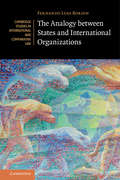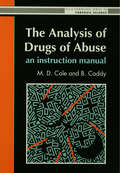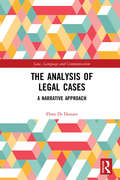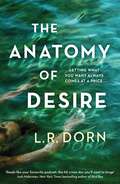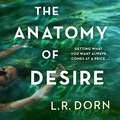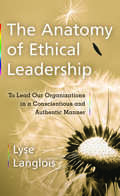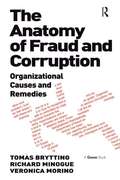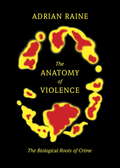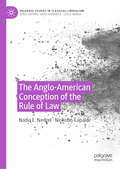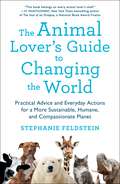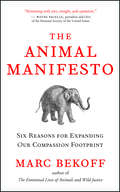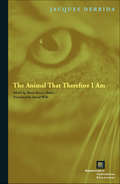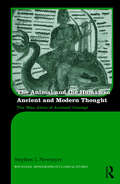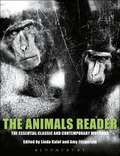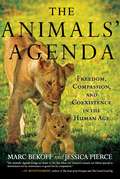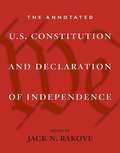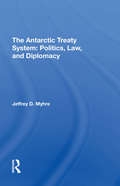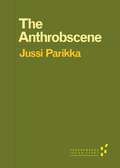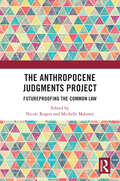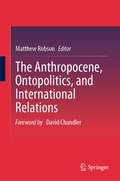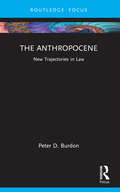- Table View
- List View
The Analects: Oxford World's Classics
by Raymond Dawson Confucius<p>Few individuals have shaped their country's civilization more profoundly than the Master Kong, better-known as Confucius (551-479 BC). His sayings and those of his disciples form the foundation of a distinct social, ethical, and intellectual system. They have retained their freshness and vigor throughout the two and a half millennia of their currency, and are still admired even in today's China. <p>This lively new translation offers clear explanatory notes by one of the foremost scholars of classical Chinese, providing an ideal introduction to the Analects for readers who have no previous knowledge of the Chinese language and philosophical traditions.</p>
The Analogy between States and International Organizations (Cambridge Studies in International and Comparative Law #138)
by Fernando Lusa BordinThe book investigates how an analogy between States and international organizations has influenced and supported the development of the law that applies to intergovernmental institutions on the international plane. That is best illustrated by the work of the International Law Commission on the treaties and responsibility of international organizations, where the Commission for the most part extended to organizations rules that had been originally devised for States. Revisiting those codification projects while also looking into other areas, the book reflects on how techniques of legal reasoning can be - and have been - used by international institutions and the legal profession to tackle situations of uncertainty, and discusses the elusive position that international organizations occupy in the international legal system. By cutting across some foundational topics of the discipline, the book makes a substantive contribution to the literature on subjects and sources of international law.
The Analysis Of Drugs Of Abuse: An Instruction Manual
by M D Cole B CaddyProvides a self-teaching reference text for forensic chemistry laboratories and law enforcement agencies world-wide. The text includes sections on the importance of physical examinations of drugs and their wrappings; and the use of gas and high-performance chromatography.
The Analysis of Legal Cases: A Narrative Approach (Law, Language and Communication)
by Flora Di DonatoThis book examines the roles played by narrative and culture in the construction of legal cases and their resolution. It is articulated in two parts. Part I recalls epistemological turns in legal thinking as it moves from theory to practice in order to show how facts are constructed within the legal process. By combining interdisciplinary paradigms and methods, the work analyses the evolution of facts from their expression by the client to their translation within the lawyer-client relationship and the subsequent decision of the judge, focusing on the dynamic activity of narrative constuction among the key actors: client, lawyer and judge. Part II expands the scientific framework toward a law-and-culture-oriented perspective, illustrating how legal stories come about in the fabric of the authentic dimensions of everyday life. The book stresses the capacity of laypeople, who in this activity are equated with clients, to shape the law, dealing not just with formal rules, but also with implicit or customary rules, in given contexts. By including the illustration of cases concerning vulnerable clients, it lays the foundations for developing a socio-clinical research programme, whose aims including enabling lay and expert actors to meet for the purposes of improving forms of collective narrations and generating more just legal systems.
The Anatomy of Desire: 'Reads like your favorite podcast, the hit crime doc you'll want to binge' Josh Malerman
by L.R. Dorn'Reads like your favorite podcast, the hit crime doc you'll want to binge'Josh Malerman, New York Times bestselling author of Bird BoxAMBITION. DESIRE. BETRAYAL. MURDER?With followers numbering in the hundreds of thousands, a glamorous circle of friends, and a famous boyfriend, the life that fitness influencer Cleo Ray has always wanted is within her grasp.Then, just before joining her friends for a holiday in the mountains, Cleo and a young woman named Rebecca set off in a canoe on a deserted lake. An hour later, Rebecca is found dead in the water and Cleo has gone missing.When word gets out, Cleo is going viral, but for all the wrong reasons. Who was the girl in the canoe? And did Cleo have anything to do with her death? If Cleo is innocent, why did she try to run? Charged with murder, this social media influencer's biggest platform is no longer Instagram, it's the witness stand...Told in the form of a true crime documentary, The Anatomy of Desire is a gripping and original psych suspense novel for the social media era - perfect for fans of You, Good Me Bad Me and the hit podcast Serial.
The Anatomy of Desire: 'Reads like your favorite podcast, the hit crime doc you'll want to binge' Josh Malerman
by L.R. DornDesire. Love. Betrayal. Murder?With followers numbering in the hundreds of thousands, a hot group of friends, and a famous boyfriend, the glamorous life that fitness influencer Cleo has always wanted is within her grasp.Then just before joining her boyfriend for a holiday in the mountains, Cleo and a young woman named Rebecca set off in a canoe on a deserted lake. An hour later, Rebecca is found dead in the water and Cleo has gone missing.When word gets out, Cleo is going viral, but for all the wrong reasons. Who was the girl in the canoe? And did Cleo have anything to do with her death? If Cleo is innocent, why did she try to run? Charged with murder, this social media influencer's biggest platform is no longer Instagram, it's the witness stand...A gripping and original psych suspense novel for the social media era - perfect for fans of You, Good Me Bad Me and the hit podcast Serial.
The Anatomy of Ethical Leadership: To Lead Our Organizations in a Conscientious and Authentic Manner
by Lyse LangloisPerformance at all costs, productivity without regard to consequences, and a competitive work environment: these are the ethical factors discussed in The Anatomy of Ethical Leadership, which highlights issues in workplace culture while looking into a brighter future for labour ethics. Langlois maintains that an enhanced awareness of the process of ethical decision making in difficult situations will lead to the establishment of practices that encourage productive relationships between co-workers. Will the twenty-first century be marked as an era leading to a healthier work environment? The Anatomy of Ethical Leadership aims to serve those in human resource management and those concerned with practical work ethic.
The Anatomy of Fraud and Corruption: Organizational Causes and Remedies
by Tomas Brytting Richard Minogue Veronica MorinoThis ground-breaking book explores what happens when the fine line between competitive excellence and fraudulent and corrupt practice is crossed. Whilst most fraud literature focuses on the individual perpetrator, The Anatomy of Fraud and Corruption looks at how organizations as a whole and the people within it behave when fraud and corruption occur. By presenting a theoretical basis and a practical methodology for fraud risk awareness training, the book helps risk management professionals, and all those in critical corporate roles to redesign and train their organizations to strengthen their culture and become more resistant and resilient to the ever present threat of fraud and corruption. The Anatomy of Fraud and Corruption demonstrates that what we see as objective facts are not always what they seem. The qualified and uniquely experienced authors present a refreshing interpretation of Cressey's triangle of need, opportunity and rationalization. They employ a drama metaphor to reflect the interaction between fraudsters, victims and bystanders on the organizational stage. Corporate design, management and culture dictate what behaviour is normal or abnormal, whether it be manager and employee behaviour or their ability to become suspicious and question apparently improper actions. Using actual cases and investigations, the organizational conditions that give rise to fraud and corruption are explored. The authors then provide important insights as to how employees may be trained and motivated to reduce the likelihood and impact of fraudulent incidents. Whilst fundamentally a practical guide, this book is also essential reading for academics wanting to stay abreast of the latest developments in the study of ethics, organizational and work psychology and sociology, and criminology.
The Anatomy of Violence: The Biological Roots of Crime
by Adrian RaineWith an 8-page full-color insert, and black-and-white illustrations throughoutWhy do some innocent kids grow up to become cold-blooded serial killers? Is bad biology partly to blame? For more than three decades Adrian Raine has been researching the biological roots of violence and establishing neurocriminology, a new field that applies neuroscience techniques to investigate the causes and cures of crime. In The Anatomy of Violence, Raine dissects the criminal mind with a fascinating, readable, and far-reaching scientific journey into the body of evidence that reveals the brain to be a key culprit in crime causation. Raine documents from genetic research that the seeds of sin are sown early in life, giving rise to abnormal physiological functioning that cultivates crime. Drawing on classical case studies of well-known killers in history--including Richard Speck, Ted Kaczynski, and Henry Lee Lucas--Raine illustrates how impairments to brain areas controlling our ability to experience fear, make good decisions, and feel guilt predispose us to violence. He contends that killers can actually be coldhearted: something as simple as a low resting heart rate can give rise to violence. But arguing that biology is not destiny, he also sketches out provocative new biosocial treatment approaches that can change the brain and prevent violence. Finally, Raine tackles the thorny legal and ethical dilemmas posed by his research, visualizing a futuristic brave new world where our increasing ability to identify violent offenders early in life might shape crime-prevention policies, for good and bad. Will we sacrifice our notions of privacy and civil rights to identify children as potential killers in the hopes of helping both offenders and victims? How should we punish individuals with little to no control over their violent behavior? And should parenting require a license? The Anatomy of Violence offers a revolutionary appraisal of our understanding of criminal offending, while also raising provocative questions that challenge our core human values of free will, responsibility, and punishment.
The Anatomy of a Lawsuit (Revised Edition)
by Peter N. SimonThis book is the story of a lawsuit between two friends. This book will trace their lawsuit from the accident through the pretrial procedures, the trial, and the appellate courts.
The Anglo-American Conception of the Rule of Law (Palgrave Studies in Classical Liberalism)
by Nicholas Capaldi Nadia E. NedzelThis book offers a multidisciplinary account of the 'rule of law' as a central pillar of the classical liberal tradition. The authors analyze the original meaning of this expression as first introduced by British jurist A. V. Dicey, before examining its subsequent elaboration by Leoni, Fuller, Hayek and Oakeshott. Addressing the main philosophical and legal aspects of the rule of law, this volume will appeal to all those engaged in law, political theory, philosophy, economics, business ethics, and public policy.
The Animal Lover's Guide to Changing the World: Practical Advice and Everyday Actions for a More Sustainable, Humane, and Compassionate Planet
by Stephanie Feldstein"This book belongs on every animal lover's shelf—and it's a particularly great gift for young people who are on fire to save animals but are unsure where to start. Hooray!!" —Sy Montgomery, author of The Good Good Pig and The Soul of an OctopusThe Animal Lover's Guide to Changing the World is the inspiring, accessible, and empowering book for everyone who loves animals and wants to live a more animal-friendly life, even if they aren’t ready to join a movement or give up bacon. With more than 7.5 billion people on the planet, wildlife is going extinct at the fastest rate since the dinosaurs. Three to four million dogs and cats are killed in shelters every year; billions of chickens, pigs, and cows are killed for food; and countless animals are killed in research labs or their habitat. The numbers are daunting, but there’s good news too! Even one person truly can make a difference without breaking the bank.With Stephanie Feldstein's straightforward and encouraging guidance, readers will learn how to take action to create a better world for the animals we love. It starts with changes as simple as taking a shorter shower, skipping meat once a week, wearing "this" not "that," and extends all the way to online activism and politics.The animals need us, so let's get on with some world changing!
The Animal Manifesto: Six Reasons for Expanding Our Compassion Footprint
by Marc BekoffIn this inspirational call to action, Marc Bekoff, the world’s leading expert on animal emotions, gently shows that improving our treatment of animals is a matter of rethinking our many daily decisions and “expanding our compassion footprint.” He demonstrates that animals experience a rich range of emotions, including empathy and compassion, and that they clearly know right from wrong. Driven by moral imperatives and pressing environmental realities, Bekoff offers six compelling reasons for changing the way we treat animals — whether they’re in factory farms, labs, circuses, or our vanishing wilderness. The result is a well-researched, informative guide that will change animal and human lives for the better.
The Animal Rights Debate: Abolition or Regulation? (Critical Perspectives on Animals: Theory, Culture, Science, and Law)
by Robert Garner Gary FrancioneGary L. Francione is a law professor and leading philosopher of animal rights theory. Robert Garner is a political theorist specializing in the philosophy and politics of animal protection. Francione maintains that we have no moral justification for using nonhumans and argues that because animals are property-or economic commodities-laws or industry practices requiring "humane" treatment will, as a general matter, fail to provide any meaningful level of protection. <P><P> Garner favors a version of animal rights that focuses on eliminating animal suffering and adopts a protectionist approach, maintaining that although the traditional animal-welfare ethic is philosophically flawed, it can contribute strategically to the achievement of animal-rights ends. As they spar, Francione and Garner deconstruct the animal protection movement in the United States, the United Kingdom, Europe, and elsewhere, discussing the practices of such organizations as PETA, which joins with McDonald's and other animal users to "improve" the slaughter of animals. They also examine American and European laws and campaigns from both the rights and welfare perspectives, identifying weaknesses and strengths that give shape to future legislation and action.
The Animal That Therefore I Am (Perspectives in Continental Philosophy)
by Jacques Derrida David Wills Marie-Louise MalletThe Animal That Therefore I Am is the long-awaited translation of the complete text of Jacques Derrida’s ten-hour address to the 1997 Cérisy conference entitled “The Autobiographical Animal,” the third of four such colloquia on his work. The book was assembled posthumously on the basis of two published sections, one written and recorded session, and one informal recorded session. The book is at once an affectionate look back over the multiple roles played by animals in Derrida’s work and a profound philosophical investigation and critique of the relegation of animal life that takes place as a result of the distinction—dating from Descartes—between man as thinking animal and every other living species. That starts with the very fact of the line of separation drawn between the human and the millions of other species that are reduced to a single “the animal.” Derrida finds that distinction, or versions of it, surfacing in thinkers as far apart as Descartes, Kant, Heidegger, Lacan, and Levinas, and he dedicates extended analyses to the question in the work of each of them. The book’s autobiographical theme intersects with its philosophical analysis through the figures of looking and nakedness, staged in terms of Derrida’s experience when his cat follows him into the bathroom in the morning. In a classic deconstructive reversal, Derrida asks what this animal sees and thinks when it sees this naked man. Yet the experiences of nakedness and shame also lead all the way back into the mythologies of “man’s dominion over the beasts” and trace a history of how man has systematically displaced onto the animal his own failings or bêtises. The Animal That Therefore I Am is at times a militant plea and indictment regarding, especially, the modern industrialized treatment of animals. However, Derrida cannot subscribe to a simplistic version of animal rights that fails to follow through, in all its implications, the questions and definitions of “life” to which he returned in much of his later work.
The Animal and the Human in Ancient and Modern Thought: The ‘Man Alone of Animals’ Concept (Routledge Monographs in Classical Studies)
by Stephen T. NewmyerAncient Greeks endeavored to define the human being vis-à-vis other animal species by isolating capacities and endowments which they considered to be unique to humans. This approach toward defining the human being still appears with surprising frequency, in modern philosophical treatises, in modern animal behavioral studies, and in animal rights literature, to argue both for and against the position that human beings are special and unique because of one or another attribute or skill that they are believed to possess. Some of the claims of man’s unique endowments have in recent years become the subject of intensive investigation by cognitive ethologists carried out in non-laboratory contexts. The debate is as lively now as in classical times, and, what is of particular note, the examples and methods of argumentation used to prove one or another position on any issue relating to the unique status of human beings that one encounters in contemporary philosophical or ethological literature frequently recall ancient precedents. This is the first book-length study of the ‘man alone of animals’ topos in classical literature, not restricting its analysis to Greco-Roman claims of man’s intellectual uniqueness, but including classical assertions of man’s physiological and emotional uniqueness. It supplements this analysis of ancient manifestations with an examination of how the commonplace survives and has been restated, transformed, and extended in contemporary ethological literature and in the literature of the animal rights and animal welfare movements. Author Stephen T. Newmyer demonstrates that the anthropocentrism detected in Greek applications of the ‘man alone of animals’ topos is not only alive and well in many facets of the current debate on human-animal relations, but that combating its negative effects is a stated aim of some modern philosophers and activists.
The Animals Reader: The Essential Classic and Contemporary Writings
by Linda Kalof Amy FitzgeraldThe study of animals - and the relationship between humans and other animals - is now one of the most fiercely debated topics in contemporary science and culture. Animals have a long history in human society, providing food, labour, sport and companionship as well as becoming objects for exhibit. More contemporary uses extend to animals as therapy and in scientific testing. As natural habitats continue to be destroyed, the rights of animals to co-exist on the planet - and their symbolic power as a connection between humans and the natural world - are ever more hotly contested. The Animals Reader brings together the key classic and contemporary writings from Philosophy, Ethics, Sociology, Cultural Studies, Anthropology, Environmental Studies, History, Law and Science. As the first book of its kind, The Animals Reader provides a framework for understanding the current state of the multidisciplinary field of animal studies. This anthology will be invaluable for students across the Humanities and Social Sciences as well as for general readers.
The Animals' Agenda: Freedom, Compassion, and Coexistence in the Human Age
by Marc Bekoff Jessica PierceA compelling argument that the time has come to use what we know about the fascinating and diverse inner lives of other animals on their behalfEvery day we are learning new and surprising facts about just how intelligent and emotional animals are—did you know rats like to play and laugh, and also display empathy, and the ears and noses of cows tell us how they’re feeling? At times, we humans translate that knowledge into compassion for other animals; think of the public outcry against the fates of Cecil the lion or the captive gorilla Harambe. But on the whole, our growing understanding of what animals feel is not resulting in more respectful treatment of them.Renowned animal-behavior expert Marc Bekoff and leading bioethicist Jessica Pierce explore the real-world experiences of five categories of animals, beginning with those who suffer the greatest deprivations of freedoms and choice—chickens, pigs, and cows in industrial food systems—as well as animals used in testing and research, including mice, rats, cats, dogs, and chimpanzees. Next, Bekoff and Pierce consider animals for whom losses of freedoms are more ambiguous and controversial, namely, individuals held in zoos and aquaria and those kept as companions. Finally, they reveal the unexpected ways in which the freedoms of animals in the wild are constrained by human activities and argue for a more compassionate approach to conservation.In each case, scientific studies combine with stories of individual animals to bring readers face-to-face with the wonder of our fellow beings, as well as the suffering they endure and the major paradigm shift that is needed to truly ensure their well-being.The Animals’ Agenda will educate and inspire people to rethink how we affect other animals, and how we can evolve toward more peaceful and less violent ways of interacting with our animal kin in an increasingly human-dominated world.
The Annotated U. S. Constitution And Declaration Of Independence
by Jack N. RakoveHere in a newly annotated edition of the two founding documents of the United States of America: the Declaration of Independence (1776), our great revolutionary manifesto, and the Constitution (1787).
The Antarctic Treaty System: Politics, Law, And Diplomacy
by Jeffrey D MyhreBecause negotiations for the Antarctic Treaty were kept secret, the issues that shaped the treaty system have been poorly understood. Dr. Myhre breaks new ground by examining the records of the first Antarctic Treaty Consultative Meetings and evaluating the events of the Special Consultative Meetings on Antarctic Mineral Resources. Introducing the reader to Antarctic politics, Dr. Myhre examines legal and political problems arising from some nations' claims to sovereignty in Antarctica, reviews initial efforts to create an international administration for the region, and studies in detail the terms of the treaty and the rules of procedure for the consultative meetings. Turning to the diplomatic events that molded the treaty system, he concentrates on the issues that emerged in the 1960s: conservation, the role of Meetings of Experts, the position of the Scientific Committee on Antarctic Research within the treaty system, the obligations of acceding states to uphold previous agreements, and the Consultative Powers' failure to establish an Antarctic Secretariat. Finally, he reviews the two main challenges to the system's survival—mineral extraction and Third World opposition to the present structure.
The Antelope's Strategy: Living In Rwanda After The Genocide
by Linda Coverdale Jean HatzfeldA powerful report on the aftereffects of the genocide in Rwanda—and on the near impossibility of reconciliation between survivors and killers In two acclaimed previous works, the noted French journalist Jean Hatzfeld offered a profound, harrowing witness to the unimaginable pain and horror in the mass killings of one group of people by another. Combining his own analysis of the events with interviews from both the Hutu killers who carried out acts of unimaginable depravity and the Tutsi survivors who somehow managed to escape, in one, based mostly on interviews with Tutsi survivors, he explored in unprecedented depth the witnesses' understanding of the psychology of evil and their courage in survival; in the second, he probed further, in talks with a group of Hutu killers about their acts of unimaginable depravity. Now, in The Antelope's Strategy, he returns to Rwanda seven years later to talk with both the Hutus and Tutsis he'd come to know—some of the killers who had been released from prison or returned from Congolese exile, and the Tutsi escapees who must now tolerate them as neighbors. How are they managing with the process of reconciliation? Do you think in their hearts it is possible? The enormously varied and always surprising answers he gets suggest that the political ramifications of the international community's efforts to insist on resolution after these murderous episodes are incalculable. This is an astonishing exploration of the pain of memory, the nature of stoic hope, and the ineradicability of grief.
The Anthrobscene (Forerunners: Ideas First)
by Jussi ParikkaSmartphones, laptops, tablets, and e-readers all at one time held the promise of a more environmentally healthy world not dependent on paper and deforestation. The result of our ubiquitous digital lives is, as we see in The Anthrobscene, actually quite the opposite: not ecological health but an environmental wasteland, where media never die. Jussi Parikka critiques corporate and human desires as a geophysical force, analyzing the material side of the earth as essential for the existence of media and introducing the notion of an alternative deep time in which media live on in the layer of toxic waste we will leave behind as our geological legacy. Forerunners: Ideas First is a thought-in-process series of breakthrough digital publications. Written between fresh ideas and finished books, Forerunners draws on scholarly work initiated in notable blogs, social media, conference plenaries, journal articles, and the synergy of academic exchange. This is gray literature publishing: where intense thinking, change, and speculation take place in scholarship.
The Anthropocene Judgments Project: Futureproofing the Common Law
by Nicole Rogers and Michelle MaloneyThis book is a collection of speculative judgments that, along with accompanying commentaries, pursue a novel enquiry into how judges might respond to the formidable and planetary-scaled challenges of the Anthropocene. The book’s contributors –from Australia, Asia, Europe, and the United Kingdom –take up a range of issues: including multispecies justice, the challenges of intergenerational justice, dimensions of postcolonial justice, the potential contribution of AI platforms to the judgment process, and the future of judging and law in and beyond the Anthropocene. The project takes its inspiration from existing critical judgment projects. It is, however, thoroughly interdisciplinary. In anticipating future scenarios, and designing or adapting legal principles to respond to them, the book’s contributors have been assisted by climate scientists with expertise in future modelling; they have benefitted from the experience of fiction writers in future worldbuilding; and they have incorporated elements of the future worlds depicted in various texts of speculative fiction and artworks. The judgments are, of necessity, speculative and hypothetical in their subject matter. Thus, taken together, they constitute a collaborative experiment in creating the inclusive and radical imaginaries of the future common law. The Anthropocene Judgments Project will appeal to critical and sociolegal academics, scholars in the environmental humanities, environmental lawyers, students, and others with interests in the pressing issues of ecology, multispecies justice, climate change, the intersection of AI platforms and the law, and the future of law in the Anthropocene.
The Anthropocene, Ontopolitics, and International Relations
by Matthew RobsonThis book addresses the ongoing need to explore the implications of the &‘Anthropocene&’ rupture for the field of International Relations (IR). Bringing together a group of established and early career academics, the chapters present a range of different ways of framing our current ecological and historical context, showing how they can be used to pursue new research directions and insights in areas of study such as governance, security, and migration. For that, each author displays their own preferences for a variety of divergent terms, ranging from more mainstream conceptions of an &‘Anthropocene,&’ to alternatives such as for instance the &‘Capitalocene&’ or Technocene. The book pursues a critical engagement with these different framings, unearthing, assessing and evaluating the ontopolitical assumptions which underpin them. In this way, the book aims to make an important political and ethical contribution to debates on the &‘Anthropocene&’ and its implications for the field of IR, engaging rigorously with scholarship largely from outside the more typical US-North European axis. In confronting the growing interest in the ontopolitics of the Anthropocene, which this book conceptualises within a variety of registers, this is a vital read for scholars and advanced students in IR, but also researchers in cognate or related disciplines such as law, geography, anthropology, sociology, and the arts.
The Anthropocene: New Trajectories in Law (New Trajectories in Law)
by Peter D. BurdonThis book introduces the concept of the Anthropocene and examines its importance for environmental legal thinking, research and practice. Two main arguments are explored. The first is that much of the scholarship in environmental law that addresses the Anthropocene does not respond to Earth systems science or the difference in scale as we move from local to global systems. Key examples include a focus on anthropocentrism, attempts to constitutionalise environmental protections, the prevalence of legal rights and the idea of ecological integrity. The second argument is that these points of focus derive from the prevalence of idealism in environmental legal scholarship. Idealism in this context does not refer to naivety or the presentation of unrealistic goals. Rather, this book is concerned with idealism as a philosophical commitment to the power of ideas to determine reality and drive future change. As expressed in legal scholarship, this book also argues that idealism involves an abstraction from material reality and a refusal to directly engage those forces that have given rise to the Anthropocene. In response, this book uses a method of critique to uncover the presumptions and presuppositions that underlie environmental scholarship. As a counter to idealism, it also sketches out a framework for materialism in the Anthropocene. This book’s engagement with these questions will appeal to undergraduate and postgraduate students in law, politics, philosophy or the ecological humanities. It will also be of interest to academics in these disciplines and libraries around the world.

